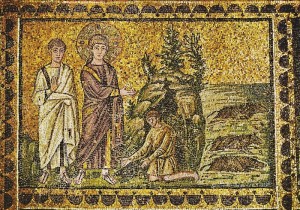9 August OS 2018 – Wednesday of the 13th Week of Matthew; Dormition Fast; S. Matthias, Apostle; S. Psoes, Monk
In today’s Gospel, we see both the Lord’s friends and His enemies stating that He is possessed.
And the multitude cometh together again, so that they could not so much as eat bread. And when his friends heard of it, they went out to lay hold on him: for they said, He is beside himself. And the scribes which came down from Jerusalem said, He hath Beelzebub, and by the prince of the devils casteth he out devils. And he called them unto him, and said unto them in parables, How can Satan cast out Satan? And if a kingdom be divided against itself, that kingdom cannot stand. And if a house be divided against itself, that house cannot stand. And if Satan rise up against himself, and be divided, he cannot stand, but hath an end. No man can enter into a strong man’s house, and spoil his goods, except he will first bind the strong man; and then he will spoil his house. – Mark 3: 20-27
This passage reveals that during His earthly ministry the Lord Jesus Christ had friends who were not His disciples. They were simply His friends, the relatives and neighbors among whom He had lived during the time before His three-year mission for the salvation of the human race. Perhaps these friends were among the people who, in another place, the Evangelist records as saying, “Is this not the carpenter’s son?” or, in other words, “Is this not merely another ordinary fellow like us?” Their saying that “he is beside Himself” means, according to S. Theophylact of Ochrid, that they believed Him possessed by a demon. Being His friends, albeit uncomprehending, they speak from concern for His welfare. They think Him a victim of evil. The scribes from Jerusalem, being His enemies, say the same thing from malice. They call Him a servant of evil.
Our own friends and relatives, both those inside and outside the Church, may try to dissuade us from a serious life according to the Gospel, because they think it bad for us. Being our friends they want us to have a comfortable life, but they (correctly) note that the Gospel interferes with this. They think us victims and wish to deliver us. Our enemies, those who openly hate the Faith, say that we are evildoers, and they wish to destroy us. Which does the greater harm, friend or foe? It is chiefly the former, because we are more inclined to listen to them.
All human beings are beside themselves from birth, in the sense of being born with minds naturally receptive to demonic deception, as a result of the ancestral sin. This is why the Holy Fathers say that all men are in plani (delusion). Most do not see strange visions or do obviously crazy things. Most have garden-variety delusion: they are fundamentally mistaken about what is really going on outside of them and inside of them. This includes us. But if we have the grace of Baptism and struggle to live the grace-filled life of the Church, we have both abundant power and accurate teaching to enable us and guide us to escape delusion in order to know and live according to truth. The entire contest of life consists in this, and we contest daily until and including the hour of death.
If we, who are both Orthodox and trying to lead a conscious spiritual life, must engage in a life-long struggle to escape delusion, what about all the other people out there? In other words, why should we listen to them? I do not mean that they cannot teach us how to grow vegetables or drive a car or do algebra. I mean that they cannot point the direction for our lives. They cannot advise us as to “what it’s all about.” When they claim that we are out of our minds, let us recall that so are they, and that probably they are farther out than we are.
O Lord, Thou only Truth and only Way, deliver us from delusion and save our souls!

